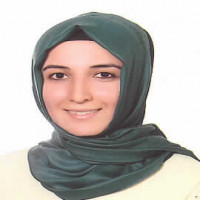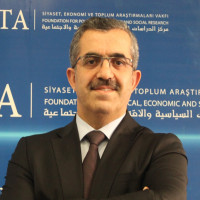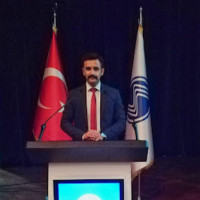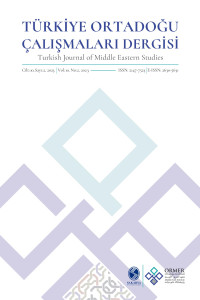Research Article
Book Review
Aim & Scope
Turkish Journal of Middle Eastern Studies (TJMES) is a peer-reviewed academic journal published for the Middle East Institute of Sakarya University which is a well-known research institution in Türkiye and the Middle East. The journal was founded in 2014 to address the need for scholarly research on Middle Eastern studies. TJMES aims to analyze contemporary and historical issues of Middle East and North Africa.
Turkish Journal of Middle Eastern Studies provides a forum for interdisciplinary scholarship based on solid empirical research and innovative critical readings of developments in the Middle East and North Africa region. Geographically, the journal focuses on the Middle East region, broadly defined as stretching across North Africa from the Atlantic coast of Morocco to Egypt and south to Sudan, to the Anatolian Peninsula (Türkiye), Iran, and the Arabian Peninsula.
TJMES welcomes academic contributions which analyse political, economic and social dynamics and developments of the Middle East region. The articles in the journal are mostly written in English and the journal prioritises contributions to the existing Middle Eastern studies literature. The journal prefers research written from multi-disciplinary perspectives and from a number of fields including but not limited to international relations, politics, sociology, history, geography, theology, philosophy, security and economics.The journal also has a book review section that covers reviews of the books on all issues of the Middle East. This helps readers of TJMES to understand current scholarly research of the field.
Author Guidelines
- The manuscripts should not be submitted simultaneously to any other publication, nor may they have been previously published elsewhere, in Turkish or English.
- Articles submitted to the journal of Turkish Journal of Middle Eastern Studies, should be original contributions and should not be published previously or should not be under consideration for any other publication at the same time.
- If another version of the paper is under consideration by any other publication, or has been, or will be published elsewhere, authors should inform the journal editors at the time of submission.
- Articles should be between 6,000-10,000 words including extended summary, footnotes and bibliography. Book reviews should be between 750-1500 words. Case analyses should be between 3000-5000 words including footnotes.
- Articles should include Turkish and English max. 200 words abstract and maximum 5 keywords in both languages.
- If the research article is written in Turkish, an extended English summary should be added after the bibliography. The extended summary should be in line with the rules of writing applied in the article and should be between 600 and 750 words.
- All quotation are preferred as “Chicago Style” in our journal.
Style:
- Papers should be written in a considerable level of academic Turkish or English.
- Manuscripts should be typed using Microsoft Word document file, in Times New Roman and 1 space. 12 font should be used within text while 10 font should be preferred for footnotes.
- References should be given both in the footnotes and in the bibliography. Reference style must conform to the Chicago Manual of Style. Please see the style for examples.
- The section titles and subtitles in the manuscripts should be numbered. (i.e. 1. Introduction, 2. Title xxx, 2.1. Subtitle xxx, etc.)
- If there are any tables, graphs and figures, they have to be included in the submitted main text file. Graphs and figures should be in one of the usual formats, at best in GIF or BMP format.
- The tables, graphs and figures should be numbered consecutively for each and should match the same numbering used in the text.
Submission:
Manuscripts must be submitted via: https://dergipark.org.tr/journal/868/submission/start
Note: If you encounter any problems with writing citation or bibliography, the data on the web page of The Chicago Manuel of Style,” http://www.chicagomanualofstyle.org/tools_ citationguide/citation-guide-1.html” should be taken as basis.
Author Guidelines
Academic impartiality and scientific quality are important criteria in the evaluation of articles submitted for publication. Therefore, the recommendations of the ICMJE (International Committee of Medical Journal Editors) and the International Standards for Editors and Authors of COPE (Committee on Publication Ethics) should be taken into account in scientific articles submitted to the TJMES journal.
General Information
- Turkish Journal of Middle Eastern Studies (TJMES) is an international peer-reviewed journal that publishes high-quality articles on social sciences.
- TJMES is a journal published twice a year in June and December.
- One article per year of each author is published.
- The language of the articles can be English or Turkish.
- The percentage of similarity in articles should be less than 20% excluding references.
- Article applications are not accepted via e-mail.
- The referee process is not initiated for articles that do not comply with the writing rules of the journal, without footnotes, bibliography, preface or abstract. The Editorial Board may take a decision for special cases. Click for the writing rules of the article.
- Ethics committee approval must be obtained for all studies on clinical and experimental humans and animals.
- Manuscripts to be published must be sent via the “Submit Article” page.
NOTE: If any editor sends an article to the TJMES, the editor's access to the editorial panel is prevented. The editor follows all processes as a writer. After the process is completed, the editorial authority is given to him again.
Required files to be uploaded when submitting an article:
- WORD document of the article prepared by considering the spelling rules (Author(s) information, name and surname, Orcid(s), responsible author, e-mail(s) must be found.)
- WORD document of the article prepared considering the spelling rules (There should be no information belonging to the authors. This file will be sent to the referees in accordance with the double-blind refereeing policy.)
- Copyright Agreement and Author Acceptance Form
Non-essential files that must be uploaded when submitting an article:
- It is recommended to upload a plagiarism report to the system.
- If necessary for the study, the approved version of the Ethics Committee Permit must be uploaded to the system. In addition, this approval (name of the board, date and number) should be stated in the "Article Information Form" at the end of the study and in the method section. Ethics committee permission is requested for all kinds of research conducted with qualitative or quantitative approaches that require data collection from the participants by using survey, interview, focus group work, observation, experiment, and interview techniques, regardless of when the study was conducted.
Ethical Principles and Publication Policy
Ethical Principles and Publication Policy
1. Ethical Principles
1. Authorship of the Paper:
Authorship should be limited to those who have made a significant contribution to the conception, design, execution, or interpretation of the reported study. All those who have made significant contributions should be listed as co-authors. Where there are others who have participated in certain substantive aspects of the research project, they should be acknowledged or listed as contributors. The corresponding author should ensure that all appropriate co-authors and no inappropriate co-authors are included in the paper and that all co-authors have seen and approved the final version of the paper and have agreed to its submission for publication.
2. Conflicts of Interest:
3. Data Access and Retention:
Authors are asked to provide the raw data in connection with a paper for editorial review, and should be prepared to provide public access to such data, if practicable, and should in any event be prepared to retain such data for a reasonable time after publication.
4. Data Fabrication and Falsification:
Fabrication and/or falsified experimental results, including the manipulation of images.
5. Duplicate / Multiple Submission(s):
Papers submitted for publication must be original and must not have been submitted to any other publication. Duplicates and multiple submissions are not considered for the publication in our journal. If authors have used their own work, either previously submitted or published, as the basis for a submitted manuscript, they are required to cite the previous work. They also need to indicate how novel contributions are offered in their submitted manuscript, over and above those of the previous work.
6. Intellectual Property:
- Authors certify that their submitted manuscript (and any supporting items) are their own intellectual property and the copyright has not been transferred to others.
- Authors certify that the manuscript contains no plagiarism, no fabrication, no falsification, no manipulated citations and that the manuscript conforms to JSS authorship policies.
- All manuscripts, revisions, drafts, and galleys remain the intellectual property of the author(s). Except as stated in the agreed license, the author(s) retain the copyright to their work.
- All review comments and reports remain the intellectual property of the reviewer or editor. Except as stated in the agreed license, the author(s) retain the copyright to their work.
- Authors, reviewers, and editors agree to keep all communications, comments, or reports from reviewers or editors confidential.
- Reviewers and editors agree to keep all manuscripts, revisions, and drafts confidential, with the exception of the final published galley(s).
7. Correction, Retraction, Expression of Concern:
- Editors may make corrections if they detect minor errors in the published article that do not affect the findings, interpretations, or results.
- Editors may retract the article in case of major errors/violations that invalidate the findings and results.
- Editors may issue a statement of concern if there is a possibility of abusive research or publication by the authors, if there is evidence that the findings are unreliable and the authors' institutions have not investigated the incident, or if the potential investigation seems unfair or inconclusive. COPE and ICJME guidelines are taken into account with regard to the correction, retraction, and expression of concern.
8. Publication of Studies Based on Surveys and Interviews:
Aiming to establish ethical assurance in scientific periodicals, the TJMES adopts the principles of the "Code of Conduct and Best Practice Guidelines for Journal Editors" and the "Code of Conduct for Journal Publishers" published by the Committee on Publication Ethics (COPE). In this scope, the following aspects should be adhered in the studies submitted to the journal:
- Ethics committee approval should be obtained for research conducted in all the disciplines that require ethics committee approval, and this approval should be stated and documented in the article.
- In studies that require ethics committee approval, information about the approval (committee name, date and issue number) may be included in the method section of the study. However, in case reports, information about the informed consent and the signed consent form should be included in the Article Information Form at the end of the article.
The studies that require ethics committee approval are as follows:
- All kinds of research conducted with qualitative or quantitative approaches that require data collection from participants through surveys, interviews, focus group works, observations, experiments and other interview techniques.
- Use of humans and animals (including material/data) for experimental or other scientific purposes,
- Clinical studies conducted on humans,
- Studies conducted on animals,
- Retrospective studies in accordance with the law on the protection of personal data,
Also;
- A statement confirming that an "informed consent form" has been received in case reports,
- Obtaining permission from the owners for the use of scales, surveys or photographs belonging to others,
- A statement confirming that copyright regulations are met for the intellectual and artistic works used.
9. Policy of Publishing Additional or Special Issues:
- Additional or Special issue: An issue published in addition to the regular issues of a periodically published journal. It may consist of conference papers or a series of articles focusing on a specific topic.
- Page numbering in the additional or special issue is different from the regular issues.
- The print run of the additional or special issue cannot be more than one third of the regular issue. The special issues containing conference paper abstracts are not included in this scope.
- Ratios of case reports, compilations and research articles (excluding conference paper abstracts) published in the additional or special issue will be included in the ratios of articles published in other issues.
- The issues published as a tribute are not accepted as an additional or special issue. Their page numbering and organization are the same as the regular issues.
10. Research Misconduct: Plagiarism Action Plan and Measures of the Journal:
The journal respects intellectual property rights and aims to protect and promote the original work of its authors. Having plagiarized content in articles do violate the research and originality standards. Therefore, all the authors submitting articles to the journal are expected to comply with the ethical standards and avoid all forms of plagiarism. If a submitted or published article is suspected of containing plagiarism, the Publication Board of the journal first examines the work. Then the work is reviewed by the Editorial Board. Afterwards, the journal contacts the author(s) and asks them to submit their justifications within 15 days. If the journal does not receive any response from the author(s) within the specified time, it would contact the affiliated university and request the investigation of the claim.
The journal will take the following serious measures for published articles that are found to contain plagiarism:
- The journal will immediately contact the university to which the author(s) are affiliated, in order to take final action against the related author.
- The journal will remove the PDF copy of the published article from the website, will remove the published article from the issue file, and will disable all links to the published article. The phrase "Plagiarized Article" will be added to the title of the published article.
- The journal will disable the author's account and reject all future submissions by the author for the following 2 years.
If plagiarism/self-plagiarism is detected, the authors are informed. An article with a high overall similarity rate (maximum 20%) or with more than 3% similarity rate from a single source may be rejected or sent back to the author to reduce the similarity rate.
Actions that violate scientific research and publication ethics are as follows:
Plagiarism: Showing others' original ideas, methods, data or works as their own work, partially or completely, without reference to scientific rules,
Republishing: Presenting repetitive publications as separate publications in academic appointments and promotions,
Slicing: Dividing the results of a research into pieces in an improper way or in a way that disrupts the integrity of the research and publishing each one separately to increase total publication count for academic appointments and promotions,
Unfair Authorship: Including non-contributors in the author list or not including those who have contributed, changing the author's order in an unjustified and inappropriate manner, removing the names of contributors from the work in subsequent editions, using influence to include names among the authors despite not being contributors,
Other ethical violations include:
- Not specifying the supporting individuals, institutions or organizations and their contributions in the publications made as a result of research conducted with support.
- Using theses or studies that have not yet been submitted or have not been accepted as a source without the permission of the owner,
- Not complying with ethical rules in research on humans and animals, not respecting patients' rights in publications,
- Violating the provisions of the relevant legislation in biomedical research and other clinical research related to humans,
- Sharing the information in a work that has been assigned for review with others before it is published without the explicit consent of the author,
- Misusing resources, spaces, facilities and equipment provided or allocated for scientific research,
- Deliberately making a false and ungrounded allegation about ethical violation,
- Publishing the data obtained from surveys conducted as part of a scientific study without the explicit consent of the participants, or without the permission of the relevant institution if the study is conducted in an institution,
- Harming animal health and ecological balance in research and experiments,
- Failing to obtain written permissions from authorities that are required for starting research activities or experiments,
- Conducting research activities or experiments in violation of the related legislation or the provisions on research and experiments in the international conventions to which Türkit is a party,
- Disregarding the obligation to inform and warn the relevant authorities about possible harmful practices related to the scientific research.
- Not using the data and information obtained from other individuals or institutions in scientific studies to the extent and as permitted, not respecting the confidentiality of this information and not ensuring its protection,
- Making false or misleading statements regarding scientific research and publications in academic appointments and promotions.
- Studies must be original and based on research.
- It must be ensured that all the persons mentioned as authors/co-authors have contributed to the article. It is against scientific ethics to show persons who have not made any academic contribution as additional authors or to rank the authors by non-scientific criteria such as title, age and gender, regardless of the order of contribution.
- In the articles with multiple authors, it should be clearly stated to what extent the authors have contributed to which stage of the article.
- The article should not be sent to different journals at the same time and should not have been sent to another journal before. If it is found to have been sent to another journal, the publication process will be cancelled.
- It is assumed that the authors who submit articles to the journal have read and accepted the publication and writing principles of the journal, and the authors are deemed to have committed to these principles.
- The citations and bibliography should be complete.
- Plagiarism and fake data should be avoided.
- The similarity rate obtained as a result of the similarity checks should not exceed 20% in order to initiate the peer review process.
- An article may be included in a maximum of 2 PRE-REVIEW processes. The article will be rejected if the feedback conveyed to the author is not revised.
- Authors should not resubmit the same studies previously rejected in our journal. In such a case, the studies will be rejected.
- The corresponding author must inform the journal editor in case of any conflict of interest.
In this scope, WAME can be referred:
https://www.wame.org/conflict-of-interest-in-peer-reviewed-medical-journals
Ethical Guidelines for Peer Reviewers:
- Peer reviewers should be aware that they play a critical role in the academic quality of the article to be published in the journal, and they should engage in the peer review process with the responsibility of improving academic quality.
- Peer reviewers should only accept to review articles for which they have the expertise to make an appropriate assessment. They should also respect the confidentiality of the blind peer review process and keep the details of the article confidential at all costs.
- After the review process, any information about the reviewed article should not be shared with others under any circumstances.
- Peer reviewers should only evaluate the accuracy of the content of the articles and their compliance with academic criteria. Any difference of opinions between the article's argument and the peer reviewer should not affect the review process.
- Peer review reports should be objective and measurable. Libelous, derogatory or accusatory expressions should definitely be avoided.
- Peer reviewers should avoid superficial or inaccurate statements in their peer review reports. In reviews with negative results, a complete justification should be presented on the aspects that led to the negative result.
- Peer reviewers should review the articles within the time period allotted to them. If they are not going to review the article, they should notify the journal within a reasonable time.
Ethical Guidelines for Editors:
- Editors should accept articles that will contribute to the relevant areas specified in the journal policy.
- Editors should not have any conflict of interest with accepted or rejected articles.
- Editors have full responsibility and authority to accept or reject an article.
- It is editors' responsibility to keep the names of peer reviewers and authors mutually confidential.
- Only the articles that will contribute to the relevant field should be accepted.
- If an error is detected, editors should support the correction or retraction of the error.
- It is the duty of editors to complete the pre-review, peer review, editing and publishing processes of the articles submitted to the journal in a timely and appropriate manner.
- Editors should not assign people who do not contribute to the journal as editorial board members or associate editors.
2. Publication Policy
Any manuscript that is considered to be published in the TJMES must meet the following criteria:
- Originality
- Not containing ethical violations
- Having clear messages for the scientific community
- Expressing the extent of the article's contributions to researchers in the field and its relevance to social sciences
- Current fields and topics drawing the interest of researchers in the field of social sciences
- Having structural and logical integrity
- Research results that are based on scientific evidence
- Coherence of the scientific method
Articles can be submitted to the TJMES by registering in the "Article Management System" on. https://dergipark.org.tr/en/pub/tocd. Articles sent by e-mail will not be taken into consideration.
Pre-Review and Plagiarism Checking:
The journal's compliance with the writing rules is examined and a similarity check is made to prevent plagiarism. A similarity software is used in the checking process. The overall similarity rate should be less than 20% and the similarity rate from a single source should be maximum 3%. If the similarity rate is more than 20%, the study is either rejected or sent back to the author to reduce the similarity rate. The pre-review is completed within a maximum of 30 days.
Editor/Field Editor Review:
After the study passes the stages of pre-review and similarity checking, it is reviewed by the relevant editor/field editor in terms of subject, scope, language use and academic competence. This review is completed within a maximum of 30 days.
Peer- Review Process (Double-Blind Peer Review):
Studies that pass pre-review and editorial review undergo a confidential double-blind peer-review process. Within the double-blind strategy, the identity of the peer reviewer is concealed from the author submitting publications to the journal. Similarly, the peer reviewers do not know who wrote the article they are reviewing. In other words, the peer review process is conducted by keeping both authors and peer reviewers anonymous to each other. The reports are also stored in the Article Management System.
Author's Revision:
Authors take into account the feedback, criticisms and recommendations of the reviewer and the Editorial Board. In case of any disagreement, they have the right to appeal with their justifications. Authors edit the article as per the reports and upload the final version of the article to the system.
Field Editor Review:
The field editor checks whether the author has made the requested corrections in the text. If there is a “Major Revision” requirement in the peer review reports, they send the article to the relevant peer reviewer. If there is "Acceptance" or "Minor Revision" requirement and the revisions are completed, they can submit the article for language checks (The checking process is completed within a maximum of 7 days.). If they detect that the corrections have not been made, they re-send the article to the author. They may reject the article if the author does not make the corrections again. Articles that are not accepted for publication are not deleted from the system. Their processes and files are stored in the system.
Turkish Language Checks:
Studies that pass the peer-review process are examined by the Turkish Language Editor and if necessary, corrections are requested from the author. The checking process is completed within a maximum of 15 days.
English Language Checks:
Studies that pass the Turkish language control are reviewed by the English Language Editor and if necessary, corrections are requested from the author. The checking process is completed within a maximum of 15 days.
Editorial Board Review:
The articles that pass technical, academic and linguistic reviews are examined by the Editorial Board and the final publication status is determined. In case of any objection from the members, the Board decides by majority of votes.
Typesetting and Layout Process:
The journal undertakes the typesetting and layout processes of the studies decided to be published by the Editorial Board.
Language:
Change of Authorship:
The Editorial Board of the journal deals with objections and appeals within the scope of COPE guidelines. Authors can contact the Editorial Office directly for their objections and appeals. When needed, an impartial representative will be appointed for issues that cannot be resolved by the Editorial Board. The Editor-in-Chief will make the final decision in the decision-making processes regarding objections and appeals.
Journal Policies on Data Sharing and Reproducibility:
Turkish Journal of Middle Eastern Studies (TJMES) strongly recommends author(s) submit supplementary material and data sets which illustrate the results shown in their papers. If any restrictions exist on the side of the author(s), these concerns should be shared with the editorial teams during the submission of scientific papers.
TJMES encourages author(s) to share data and make them publicly available if they do not violate human rights or other privacy issues. Authors are recommended to cite any data referenced in their studies. Cited data sets, apart from whether they are created by author(s) or not, should be written in the reference lists of papers. Authors are also recommended to include a data availability statement.
TJMES encourages all authors to make their data available to share publicly.
Disclaimer:
Price Policy
• TJMES does not request any fees for article submission, reviewing and editing processes, page-layout, and publication (page or color fees).
• TJMES does not pay any fees to authors, reviewers, editors, and editorial board members.
• All papers on TJMES are free to read and download.
• TJMES signed on to the Budapest Open Access Initiative (BOAI), which promotes free access to research literature and has adopted the Open Access Principles that are clarified in this initiative.
• All papers on TJMES are archived with the LOCKSS (Lots of Copies Keep Stuff Safe) system through TÜBİTAK ULAKBİM DergiPark.
• TJMES does not accept announcements, advertisements, sponsorships, etc. due to its publication policy.
• TJMES is an open-access journal that does not request any subscription fees.
• We do not offer a reprint service for those requiring professional-quality reproductions of papers.
• All expenses of the TJMES journal are covered by the publisher.
Indexes
Citation Indexes
Other Indexes
Journal Boards
Editor-in-Chief

Field Editors








 Web
Web

Book Review Editor

Assistant of Editor-in-Chief

Managing Editor

Assistant Editors - Technical Editors








 Web
Web



PreFlight Editor

Turkish Language Editor

English Language Editor







 Web
Web
Ethics Editor

Secretariat

Statistics Editor

Editorial Board








 Web
Web






 Web
Web






Layout Editor


The published articles in TJMES are licensed under a
Creative Commons Attribution-NonCommercial 4.0 International License











